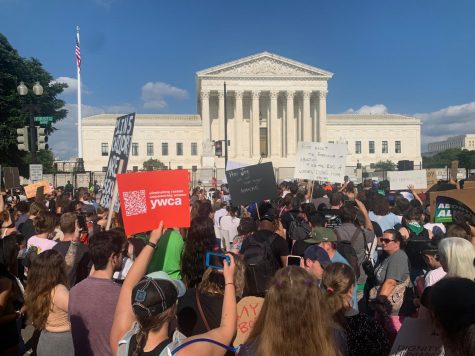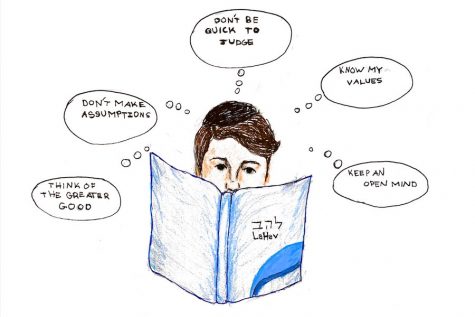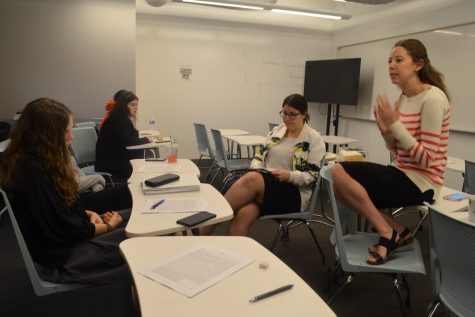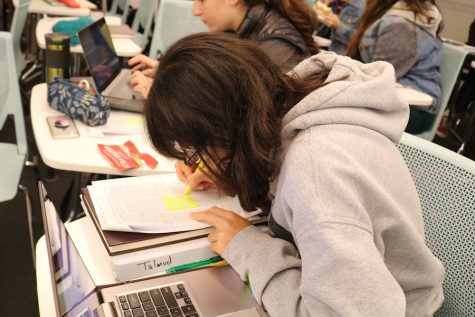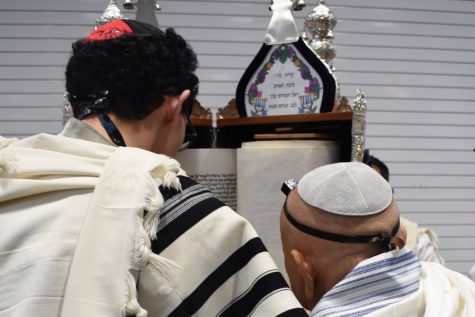Sparks don’t quite fly as leaders of two branches of Modern Orthodoxy face off at Shalhevet Institute
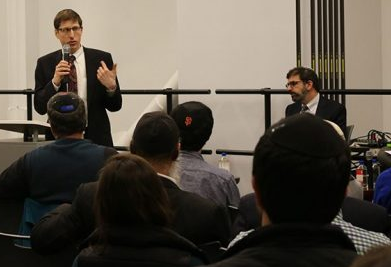
Despite its title, “Disagreement Without Division” turned out to have very little disagreement. Rabbi Jeremy Weider and Rabbi Asher Lopatin came to speak at a Shalhevet Institute event Dec. 22, and with one exception, agreed on just about everything that came up.
The exception had to do with whether being Modern Orthodox meant to challenge but then obey, or to challenge and look for ways to innovate.
Judaic Studies teacher and Institute director Rabbi Ari Schwarzberg moderated the discussion between Rabbi Weider, the Rosh Yeshiva of the Rabbi Isaac Elchanan Theological Seminary (RIETS) – Yeshiva University’s rabbinical school – and Rabbi Lopatin, the president of Yeshivat Chovevei Torah Rabbinical School faced off in the Beit Midrash before an audience of about 140.
Rabbi Weider spoke first and compared today’s religious disputes to when God tested Abraham, asking him to sacrifice his son Isaac – a story known as the akeida.
“The approach that I personally adopt is that one is certainly entitled to question,” said Rabbi Weider. “One is entitled to challenge. But the lesson of the akeida… is at the end of the day one has to obey.
“One can have a lot of questions and be troubled by a lot of issues, but nonetheless, the mark of someone who is a God-fearer, someone who is an eved Hashem [servant of God] is that an eved obeys.”
Rabbi Lopatin responded by saying that the core of Modern Orthodoxy is not to “obey.”
“Really, I think the idea in general is looking at the outside world, listening,” said Rabbi Lopatin. “Yes we might reject parts of the outside world, but let’s listen. Let’s think about it, and rather than that being a threat to our Judaism… that is something that is going to allow us to come up with new understandings that we want in our Judaism.”
Beyond that, Rabbi Weider and Rabbi Lopatin both agreed on most of what was discussed. The discussion continued for an hour and a half.
“When you look at them, they’re seen as very different people who believe in very different things,” said senior Isaac Goor, who attended the event. “But when they actually started talking to each other, there was very little actual disagreement. They didn’t seem like they disagreed on that much.”
The agreement between the two speakers was noted at the event by Rabbi Schwarzberg towards the end of the program.
“The two people who are speaking to one another actually seem to be far more in consonance and agreement with one another than they actually disagree with one another,” Rabbi Schwarzberg said.
Many had expected to hear a fiery debate between the two rabbis about the practice of Modern Orthodoxy. However, Rabbi Schwarzberg said before the discussion began that that was not the purpose.
“We’re trying to take what is done here in the school every day, and that is create a Torah education that is meaningful and that is done through the prism of discourse,” said Rabbi Schwarzberg.
He went on to quote the ninth chapter of Kohelet, or Ecclesiastes.
“The goal here is… quoting the ninth perek of Kohelet: ‘The words of the wise are spoken with gentleness,’” Rabbi Schwarzberg said. “…Hopefully this will model the gentleness of Torah scholars.”
Each rabbi was given 10 minutes for opening remarks discussing “who they are, and perhaps who they are not,” Rabbi Schwarzberg announced. Following that, each rabbi was given five minutes to respond, and then the floor was opened up to questions from Rabbi Schwarzberg and the audience.
Rabbi Weider offered “a proxy for a brief description of what Orthodoxy, and specifically Modern Orthodoxy, means to me.”
“Judaism has been… and must continue to be… countercultural,” said Rabbi Weider. “To be countercultural, you have to be two things. Firstly, you have to be cultural, which means you have to be part and parcel of a particular culture. Certainly our community finds itself in the center of western culture.
“But at the same time one has to be ‘counter.’ One has to reject some of the cherished values and sacred cows. In effect we have to be… ger v’toshav, a stranger, and yet at the same time we are a citizen in this broader Western community.”
Rabbi Weider went on to say that while there are many halachik issues that seem to be dividing the Jewish community, the real threats to Modern Orthodoxy are not these “hot-button issues” but economic issues and apathy.
“One only needs to spend a lot of time with a fair number of young people, high school students, and apathy towards, maybe everything in life, but certainly Torah, I think is the most challenging problem,” said Rabbi Weider.
“I think the apathy is a product of spiritual shallowness, which sometimes is a problem in our community, a lack of passion for avodat Hashem [service of God], a lack of a sense of walking constantly in the presence of the Divine.”
Rabbi Lopatin used his 10 minutes to describe Modern Orthodoxy with a different emphasis.
“Modern Orthodoxy should be looking over your right shoulder… but also looking over your left shoulder and wondering what’s going on in the world around us,” said Rabbi Lopatin. “Basically, Modern Orthodoxy is the traditional, believing in our Torah, believing in the obligation, and at the same time, being sensitive to the world around us and not being afraid of that.”
He stressed the importance of chidush, or innovation. Saying that there must be a balance between the aron, which represents the tradition, and the menorah, which represents new ideas.
“There will be new understandings of the Torah in every generation, and that is what we are supposed to seek out,” Rabbi Lopatin said.
“And when there’s something that bothers us in the Torah, in our halacha, and we find it difficult… ask, is this what chazal [the great rabbis of the past] really wanted? Is this what the Shulchan Aruch is really saying?”
But the “hot-button issues” that Rabbi Weider mentioned – including homosexuality and women’s roles in Judaism – were also discussed.
Rabbi Schwarzberg ended the evening by asking the two rabbis whether they thought that, given how much they agree, there is a schism within Modern Orthodoxy after all. They agreed: yes.
Rabbi Weider said that there were two issues that create a schism: partnership minyanim – Orthodox services where women perform some roles traditionally filled by men – and the question of Torah misinai, which is the idea that the everything in the Torah was told by God to Moshe at Mt. Sinai and is equally eternal, binding and true.
He said he himself could not pray at a partnership minyan.
“I think it is schismatic by its nature,” Rabbi Weider said. “…I think it’s representative, to me, of what I perceive sometimes as not a careful approach to halacha.”
He said Orthodox Jews must believe that God commanded the entire Torah, because otherwise there are certain aspects of our halachik observance that become wrong.
“If you don’t believe that God commanded the halachik system in total, then many of our practices that are troubling become immoral.”
Rabbi Lopatin agreed with Rabbi Weider on the question of Torah misinai, so there seemed to be no schism there.
“I agree with you that to be Orthodox, you have to believe in Torah misinai,” said Rabbi Lopatin. “If you don’t believe that, you can be a wonderful person, but you’re not Orthodox.”
But Rabbi Lopatin said that idea did not mean there should be no disagreement.
“I embrace the rough and tumble of debate,” said Rabbi Lopatin. “Let’s have good back-and-forth. I’d like it to be respectful, ideally, but most important is lets have a conversation… If you have an opinion, say it, and let’s all talk together and have that free market of ideas.”
Outside the Shalhevet Beit Midrash, however, the most visible schism in Modern Orthodoxy may be that the main Orthodox rabbinical group, the Rabbinical Council of America, accepts graduates of RIETS but not of Yeshivat Chovevei Torah as member rabbis.
According to The Forward, Chovevei applied for members in the RCA in 2006, then withdrew its application after learning it would be rejected.
So there was at least some disagreement. Whether there was also division was still a matter of – debate.
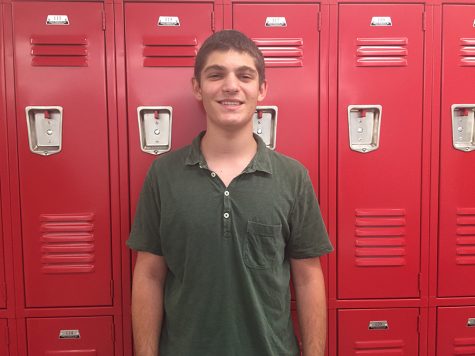
Zev Kent is a senior at Shalhevet and is the Senior Editor and Features Editor of the Boiling Point. Over the past three years, Zev has written many articles for the Boiling Point about sports, community, and outside news. In addition, he did play-by-play for the Boiling Point broadcast of the Steve Glouberman Basketball Tournament.

